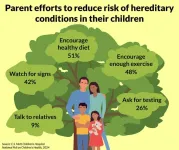(Press-News.org) Climate scientists have long agreed that humans are largely responsible for climate change. However, people often do not realize how many scientists share this view. A new 27-country study published in the journal Nature Human Behaviour finds that communicating the consensus among scientists can clear up misperceptions and strengthen beliefs about climate change.
The study is co-led by Bojana Većkalov at the University of Amsterdam and Sandra Geiger of the University of Vienna. Kai Ruggeri, professor of health policy and management at Columbia University Mailman School of Public Health, is the corresponding author.
Scientific consensus identifying humans as primarily responsible for climate change is not new and was already forming in the 1980s. Today, 97 percent to 99.9 percent of climate scientists agree that climate change is happening and that human activity is the primary cause. Over the past decade, researchers have begun to study the effects of communicating this overwhelming consensus, with promising results. They found that people in the United States who read a short statement about this scientific consensus perceived the consensus to be higher believed more in human-caused climate change, and worried about it more than those who read an unrelated expert statement.
However, as is the case with many findings in behavioral science, we know little about the effects of communicating this consensus beyond the United States. The new research now provides an answer.
An international research team of 46 collaborators showed different scientific consensus messages to more than 10,500 people across the world and asked them about their opinions on climate change. They observed that previous findings from the United States hold true among 27 countries covering six continents. People across all 27 countries responded similarly to the scientific consensus on climate change. Co-lead author Geiger further explains: “In response to reading about the 97 percent consensus, people adjusted their perceptions of the scientific consensus, believed more in climate change, and worried more about it—but they did not support public action on climate change more, though other research has found that support for action can be stimulated indirectly by changing how people think and feel about climate change.”
By now, climate scientists agree on much more than the existence and causes of climate change: 88 percent agree that climate change constitutes a crisis. How do people react when they learn about this additional crisis consensus? Interestingly, this added piece of information did not have any effects. Co-lead author Većkalov explains: “We believe that the gap between the actual and perceived consensus might have played a role. This gap was much smaller for the crisis consensus than for the 97% consensus. A smaller gap means people already perceived a high crisis consensus before learning about it, which might have prevented any further changes in beliefs about climate change.”
These new findings show that it is still important to emphasize the consensus among climate scientists – be it in the media or in our everyday lives when we have conversations about climate change and its impacts. “Especially in the face of increasing politicisation of science and misinformation about climate change, cultivating universal awareness of the scientific consensus will help protect public understanding of the issue”, added senior author, Sander van der Linden.
Beyond climate change communication, these findings also underscore the importance of testing previous findings in behavioral science globally. “Such endeavors are only possible if we bring together researchers from around the world. What is particularly unique about this work is the involvement of students and early-career researchers from the Junior Researcher Programme (JRP) and the Global Behavioral Science (GLOBES) program at Columbia University,” said Kai Ruggeri.
A full list of authors is available in the study article.
END
Communicating consensus strengthens beliefs about climate change
2024-08-26
ELSE PRESS RELEASES FROM THIS DATE:
Almost half of FDA-approved AI medical devices are not trained on real patient data
2024-08-26
Artificial intelligence (AI) has practically limitless applications in healthcare, ranging from auto-drafting patient messages in MyChart to optimizing organ transplantation and improving tumor removal accuracy. Despite their potential benefit to doctors and patients alike, these tools have been met with skepticism because of patient privacy concerns, the possibility of bias, and device accuracy.
In response to the rapidly evolving use and approval of AI medical devices in healthcare, a multi-institutional team of researchers at the UNC School of Medicine, Duke University, Ally Bank, Oxford University, Colombia University, and University of Miami have been on a mission to build ...
Does the extent of structural racism in a neighborhood affect residents’ risk of cancer from traffic-related air pollution?
2024-08-26
High levels of traffic-related air pollutants have been linked with elevated risks of developing cancer and other diseases. New research indicates that multiple aspects of structural racism—the ways in which societal laws, policies, and practices systematically disadvantage certain racial or ethnic groups—may contribute to increased exposure to carcinogenic traffic-related air pollution. The findings are published by Wiley online in CANCER, a peer-reviewed journal of the American Cancer Society.
Most studies suggesting that structural racism, which encompasses factors such as residential segregation and differences in economic status and homeownership, may influence ...
2 in 3 parents want help preventing their child from developing hereditary health conditions
2024-08-26
ANN ARBOR, Mich. – Among things many families don’t wish to pass down to their children and grandchildren: medical issues.
One in five parents say their child has been diagnosed with a hereditary condition, while nearly half expressed concerns about their child potentially developing such a condition, a new national poll suggests.
And two thirds of parents want their healthcare provider to suggest ways to prevent their child from developing a health problem that runs in the family, according to the University of Michigan Health C.S. Mott Children’s Hospital National ...
Could psychedelic-assisted therapy change addiction treatment?
2024-08-26
by Amy Norton
PISCATAWAY, NJ – After years of being seen as dangerous “party drugs,” psychedelic substances are receiving renewed attention as therapies for addiction -- but far more research is needed, according to a new special series of articles in the Journal of Studies on Alcohol and Drugs, published at Rutgers University.
Psychedelics are substances that essentially alter users’ perceptions and thoughts about their surroundings and themselves. For millennia, indigenous cultures have used plants with psychedelic properties in traditional medicine and spiritual rituals. And for a time in the mid-20th ...
Sustaining oyster farming with sturdier rafts
2024-08-26
Amid the rising human population and pressure on food supplies, the world can’t be everyone’s oyster. But perhaps there might be more oysters to eat if an Osaka Metropolitan University-led research team’s findings mean sturdy plastic rafts will be used in their farming.
Conventional oyster farming uses bamboo rafts with additional flotation devices such as Styrofoam. Though relatively affordable, these rafts can be damaged in typhoons. The OMU-led researchers propose a polyethylene raft that keeps costs manageable but is about five times more durable than a bamboo raft.
OMU Graduate School of Engineering Associate ...
People of lower socioeconomic status less likely to receive cataract surgery in private clinics
2024-08-26
Despite increased funding for cataract surgeries to private, for-profit clinics, access to surgery fell 9% for lower-income people, according to new research published in CMAJ (Canadian Medical Association Journal) https://www.cmaj.ca/lookup/doi/10.1503/cmaj.240414.
“Unexpectedly, despite new public funding for operations provided in private for-profit surgical centres, which was intended to fully cover all overhead costs and remove the need to charge patients, this disparity did not decrease, but instead grew ...
Tick-borne Powassan virus in a child
2024-08-26
With tick-borne viruses such as Powassan virus increasing in Canada, clinicians should consider these infections in patients with encephalitis, as a case study shows in CMAJ (Canadian Medical Association Journal) https://www.cmaj.ca/lookup/doi/10.1503/cmaj.240227.
Although rare, Powassan virus is serious, with a death rate of 10%–15% in people with encephalitis, and it can cause lingering health effects after infection. The virus can transmit within 15 minutes of tick attachment, and symptoms can develop 1–5 weeks later.
In this case study, a 9-year-old child with up-to-date vaccinations ...
Survey finds more than 3 in 4 Americans don’t feel they could help someone suffering an opioid overdose
2024-08-26
EMBARGOED UNTIL 12:01 A.M. AUGUST 26, 2024
NOTE TO EDITOR: (To download broadcast-quality video and other multimedia elements: https://bit.ly/3M2ljhX (password: naloxone)
COLUMBUS, Ohio – International Overdose Awareness Day is a worldwide campaign held each Aug. 31 that acknowledges the grief of family and friends left behind from those who have died from a drug overdose. This year’s campaign theme “Together we can” highlights the power of the community standing together to help end overdose.
However, a new survey of 1,000 Americans from The Ohio State University Wexner Medical ...
How to control your screentime use and make technology work for you
2024-08-26
Many of us feel that we, or our children, spend too much time staring at a screen. From gaming to social media use or ‘doomscrolling,’ it can sometimes feel that we are mindlessly spending hours going down a rabbit hole of technology.
However, according to Catherine Knibbs, a psychotherapist who specializes in cybertrauma and online harms, there are tangible steps we can all take to wrestle back control from the hands of the technology corporations.
In her new book, Managing Your Gaming and Social ...
Matching dinosaur footprints found on opposite sides of the Atlantic Ocean
2024-08-25
DALLAS (SMU) – An international team of researchers led by SMU paleontologist Louis L. Jacobs has found matching sets of Early Cretaceous dinosaur footprints on what are now two different continents.
More than 260 footprints were discovered in Brazil and in Cameroon, showing where land-dwelling dinosaurs were last able to freely cross between South America and Africa millions of years ago before the two continents split apart.
“We determined that in terms of age, these footprints were similar,” Jacobs said. “In their geological and plate ...





